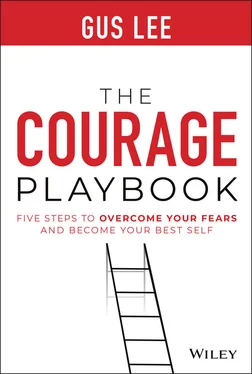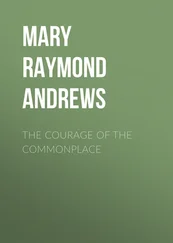Gus Lee - The Courage Playbook
Здесь есть возможность читать онлайн «Gus Lee - The Courage Playbook» — ознакомительный отрывок электронной книги совершенно бесплатно, а после прочтения отрывка купить полную версию. В некоторых случаях можно слушать аудио, скачать через торрент в формате fb2 и присутствует краткое содержание. Жанр: unrecognised, на английском языке. Описание произведения, (предисловие) а так же отзывы посетителей доступны на портале библиотеки ЛибКат.
- Название:The Courage Playbook
- Автор:
- Жанр:
- Год:неизвестен
- ISBN:нет данных
- Рейтинг книги:4 / 5. Голосов: 1
-
Избранное:Добавить в избранное
- Отзывы:
-
Ваша оценка:
- 80
- 1
- 2
- 3
- 4
- 5
The Courage Playbook: краткое содержание, описание и аннотация
Предлагаем к чтению аннотацию, описание, краткое содержание или предисловие (зависит от того, что написал сам автор книги «The Courage Playbook»). Если вы не нашли необходимую информацию о книге — напишите в комментариях, мы постараемся отыскать её.
The Courage Playbook: Five Steps to Overcome Your Fears and Become Your Best Self,
The Playbook
The Courage Playbook
The Courage Playbook
The Courage Playbook — читать онлайн ознакомительный отрывок
Ниже представлен текст книги, разбитый по страницам. Система сохранения места последней прочитанной страницы, позволяет с удобством читать онлайн бесплатно книгу «The Courage Playbook», без необходимости каждый раз заново искать на чём Вы остановились. Поставьте закладку, и сможете в любой момент перейти на страницу, на которой закончили чтение.
Интервал:
Закладка:
First, as individuals and as a people, we need to use UPR, Unconditional Positive Respect.
Second, UPR is achieved by practice. Practicing UPR takes courage.
What's courage? It's the deep, mystic chord with which we can lead our lives and inspire others to become their best selves. It seamlessly equips us to improve who we are. It optimizes how we use the time given us. Courage fuels our brave adventuring into a life of deeper meaning, of helping others, of serving a higher, unselfish cause in a grand narrative, of becoming who we always wished to be. It is doing that liberating right thing which at first seems undoable.
Courage counts because we often allow our anxieties, fears, and doubts to play with us like a kitten with ball of yarn. We sweat out energy worrying about the external and forget that we were internally wired to practice courage so that we can lead and live with this great, unflinching, untapped, life‐uplifting source of strength. Courage, like a world‐class runner in the blocks, merely awaits our decision to run the race of life with a stronger purpose.
Courage is many things. For starters, courage is more an action than an abstraction, and is more behavioral than theoretical. Courage is doing the highest and grandest right thing.
As a child, I had many disadvantages with the special decision‐making ability of a defective video game character. This led to a life of fear and flight, of dwindling in the face of challenges. I let myself slide into cowardice. But courage was chasing me. I knew it was there, just beyond reach. I couldn't see it and I couldn't name it—but I could sense it. Later, being coached by selfless men and women forced me to accept that even I could become courageous.
“Life,” wrote Anais Nin, “expands or shrinks in proportion to one's courage.” 2 Gaining courage stopped my shrinkage. It changed everything, like Peanuts ’ Charlie Brown, the hapless cartoon character never again losing the kite and now always getting to kick the football.
“The Y,” said Coach Tony, “ain't a boxing factory. None o’ you are likely to go pro. The Y's here for you to get inner courage. Build your character. Uh, 'specially you , kid.”
Can anyone acquire courage? Certainly. But today, many can only sense courage the way I did as a child. We know in a vague way that courage is there. But we see it incompletely and understand it imperfectly, with an ancient fear that courage is full of promise but in reality is an unwinnable lottery ticket.
Critically, we forget that courage is a set of practiced behaviors, a way of life, and a fundamental form of human identity.
Courage recruited me, an All‐American Chicken Little. I feared everything, ran from my own fears, and couldn't find “courage” in the dictionary. It methodically equipped me to obey my coaches, practice doing the right thing, train others to beat their fears, and to care for those whom I could reach. Courage gave me life. Because it can be acquired by anyone, never again would I find myself running on empty and fleeing discomfort on the fumes of my fears.
A result is The Courage Playbook, your personal invitation to flex your essential courage muscles before they atrophy from unthinking neglect. Here, intellect, emotions, actions, and inner spirit unite in a principled way so you can become who you were always supposed to be.
This differs from other books on leading your life and the like. It departs from the popular, mainstream leader and self‐development efforts that rely on listening to speakers rather than actually acquiring practical on‐the‐ground skills and focusing on self‐gain rather than on helping others. Per professor‐psychologist‐aviator‐humorist‐writer‐and‐boxer Dr. James P. Sullivan, we win greatness of ability by practicing the skills of courage instead of listening to people talk about them. Crucially, we gain courage for the common good.
The difference is captured in a simple axiom: We get courage by doing courage.
How do we do courage? By practicing its now‐forgotten behaviors.
The Courage Playbook walks you through those actions in five basic Steps.
The ideas and exercises in The Playbook come from a revolutionary courage training program that has equipped individuals and organizations to overcome their fears so they can act with unfettered freedom, resolute confidence, and a sense of humor, all for the right reasons.
It's not how I used to do it. For decades, working for top global and national leader development institutions and business schools, we taught leadership knowledge as if it were an academic subject like English or math. Thousands of smart, experienced, and educated participants took notes, enjoyed personality insights, simulation games, camaraderie, and meals and gave us 4.5 stars. They left emotionally refreshed. But their behaviors hadn't changed. Our binders sat brightly on the shelf, but the learning hadn't installed practical interpersonal abilities. They knew more than before, yet the fears they had on arrival were waiting for them when they returned. The glow lasted about a week. Yet they had not functionally improved as leaders or individuals. We'd taught intellectual theory ; we hadn't trained in actual courage and skills .
The participants’ organizations continued to practice denial and blame, avoid glaring problems, tolerate toxic managers and be stymied by poor performance, disrespect, turnover, dishonesty, and divided cultures. They drove for profits instead of quality; picked on others for not improving while refusing to change themselves; didn't want to hear the truth; chose short‐term results over sustainability and became bad companies—sadly, the very issues that had brought them to us for training. In business and in personal lives, they knew more about why they struggled, but didn't know how to implement courageous actions for authentic improvement, to become who they were supposed to be. Courage had been left out of the training schedule. It's as if they had attended a running clinic without stepping outside the classroom; they hadn't learned and then conscientiously practiced the fundamental plays, leaving them to hesitate once the starter gun sounded.
In the language of the earlier book on courage, they had read about crossing the River of Fear—the barrier between us and our best selves—but they hadn't practiced doing it and hence didn't know how to pull it off.
I realized that leadership shouldn't be only for those with rank, and courage can't be only for those who can afford an executive coach. The very definition of courage requires that it be available to everyone and that it not be for you alone; when you gain it by practice, you'll then generously share it.
Courage is essential in leadership—it's impossible to lead and inspire others to be their best selves while being anxious about approval, constantly fearing failure, or avoiding difficulties. But courage is rarely presented as central to human effort and is almost never the subject of actual, practical behavioral training. Research into our national efforts to develop positive work, family, and community cultures through leadership training has confirmed what I'd observed and learned through decades of experience.
Acutely lacking leaders, the United States spends $170 billion every year ($520 per capita) to develop them—without producing effective leaders. 3 We've tried agility, change theory, conceptualization, do what you feel, emotional intelligence, execution, fishbones, going to Gemba, pursuing Kaizen, chasing habits, laws, Lean Six Sigma, rules, break the rules, forget the rules, no rules, perseverance, positivity, quality programs, Root Cause Analysis, scrums, speed, sprints, strengths, transparency, trust, and vision.
Читать дальшеИнтервал:
Закладка:
Похожие книги на «The Courage Playbook»
Представляем Вашему вниманию похожие книги на «The Courage Playbook» списком для выбора. Мы отобрали схожую по названию и смыслу литературу в надежде предоставить читателям больше вариантов отыскать новые, интересные, ещё непрочитанные произведения.
Обсуждение, отзывы о книге «The Courage Playbook» и просто собственные мнения читателей. Оставьте ваши комментарии, напишите, что Вы думаете о произведении, его смысле или главных героях. Укажите что конкретно понравилось, а что нет, и почему Вы так считаете.












